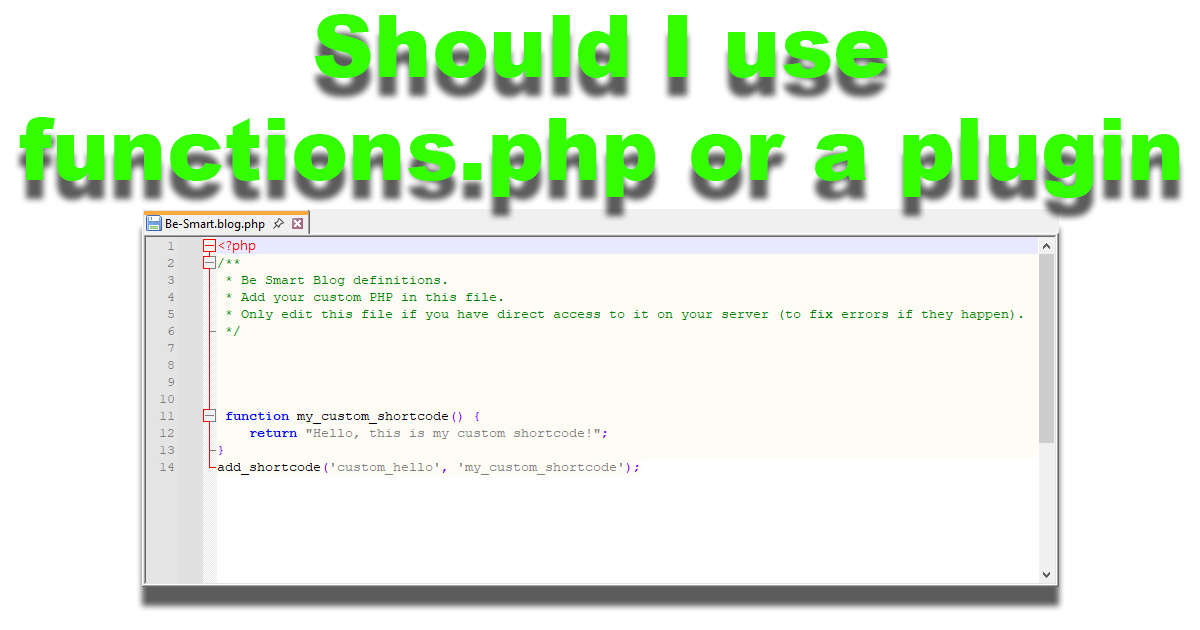Estimated Reading Time: 3 min
Whether to use functions.php or a plugin depends on the scope, purpose, and portability of the functionality you’re adding to your WordPress site. Here’s a detailed comparison to help you decide:
Use functions.php When…
- Theme-Specific Functionality If the feature or customization is directly tied to the theme’s design or behavior (e.g., custom widgets, menu locations, or styling-related hooks), it makes sense to include it in
functions.php. Examples:- Adding theme support (e.g., post thumbnails, custom logos).
- Registering navigation menus.
- Enqueueing theme-specific styles and scripts.
- You Don’t Need Portability If the functionality is irrelevant when switching to another theme,
functions.phpis appropriate. - It’s a Simple Customization Minor tweaks, such as modifying excerpt lengths or disabling emojis, are often added to
functions.phpfor convenience. - You Want Quick Testing For quick experiments or testing small snippets of code,
functions.phpprovides an easy and fast way to implement changes.
Use a Plugin When…
- Site-Wide Functionality If the feature applies to the entire website, regardless of the active theme, use a plugin. Plugins are independent of themes and persist even after switching themes. Examples:
- SEO optimizations.
- Security enhancements.
- Custom post types or taxonomies used site-wide.
- Portability Is Required If you want to reuse the functionality across multiple sites or themes, a plugin is the better option.
- Complex Features For more extensive customizations or features requiring their own settings page, database storage, or user interface, a plugin is a better choice.
- You Need Better Organization Plugins keep your functionality modular and separate from the theme, making the code easier to maintain and debug.
- Collaborative Projects If multiple developers are working on the site, separating custom functionality into a plugin ensures better workflow management.
Combining Both Approaches
You can use both functions.php and plugins for different purposes:
- Use
functions.phpfor theme-related customizations. - Use plugins for site-wide or reusable functionality.
Example Scenarios
| Use Case | Use functions.php | Use a Plugin |
|---|---|---|
| Adding a custom post type for a blog | No | Yes (site-wide relevance) |
| Enqueueing theme stylesheets | Yes | No |
| Adding a Google Analytics tracking ID | No | Yes (applies site-wide) |
| Creating shortcodes | Yes (theme-specific) or No | Yes (if reusable) |
| Disabling REST API access | No | Yes (security feature) |
Best Practices
- Start with a Child Theme Use a child theme for
functions.phpto avoid losing changes during theme updates. - Organize Plugins If you create custom plugins, group them logically, and document their purpose.
- Avoid Overloading
functions.phpFor extensive customizations, split the code into multiple files or plugins for maintainability. - Consider Long-Term Needs Think about whether the functionality should remain after switching themes.
Conclusion
- Use
functions.phpfor theme-specific, simple, and quick-to-implement customizations. - Use a plugin for site-wide, portable, or complex features.
If you’re unsure, err on the side of creating a plugin, as it keeps your functionality independent of the theme, ensuring long-term flexibility.

